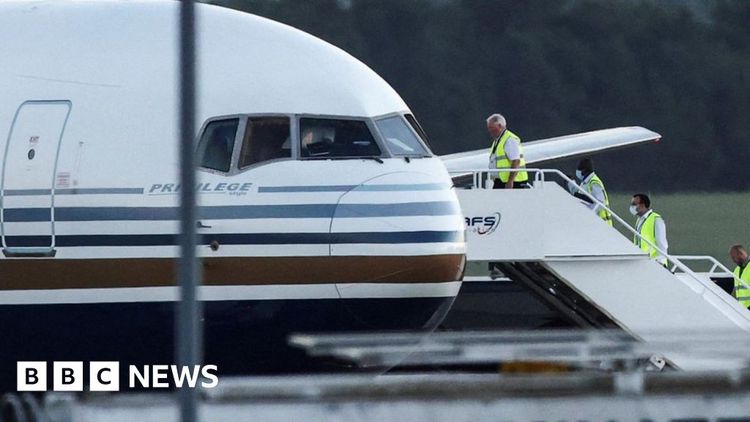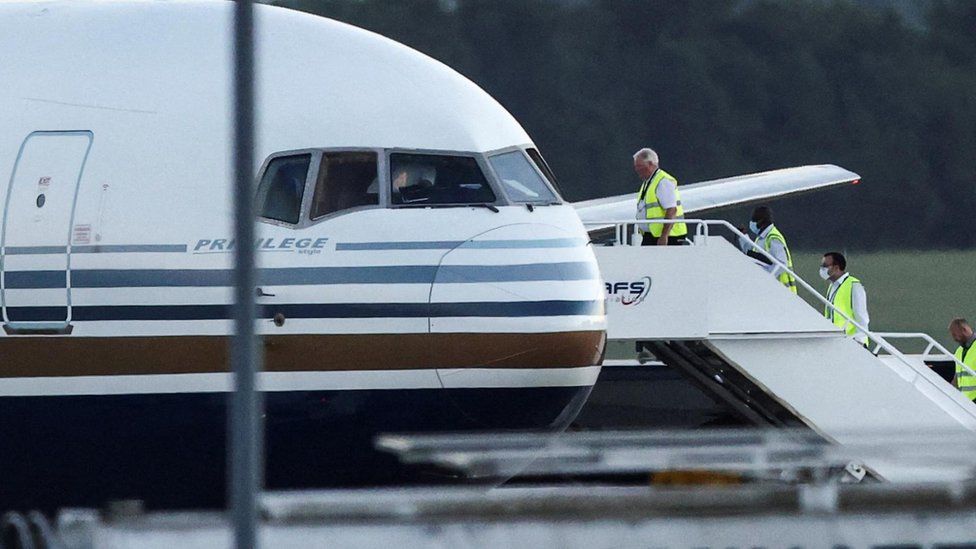Rwanda: Why a migrant plane won’t be taking off anytime soon

The initial flight to Rwanda was called off right before its departure in June 2022 due to legal obstacles.

The segment of the blog related to domestic affairs and legal matters
After a lengthy legal and political struggle spanning two years, Parliament has finally given its approval to the Rwanda bill initiated by the government, which aims to send asylum seekers from the UK to Africa for processing. As a result, it is now a matter of time before flights to Kigali will commence.
We can state that the plane motors will remain mute for the time being.
Even though the bill has been approved by Parliament, the earliest possible departure date for a flight is 12 days after the King's approval, which marks the bill as officially legalized by the government.
Based on what Prime Minister Rishi Sunak has stated, it's probable that the initial flight will take place at a later date - around 10 to 12 weeks from now, which translates to late June or early July.
On Monday, Mr Sunak acknowledged that the government would not be able to meet its own goal of having a flight by Spring, saying "That is later than we had hoped for," but he also stated that they were always aware that the process would require a significant amount of time.
Only individuals who have sought asylum in the UK and came here without permission from a different secure country may be sent to Rwanda.
This basically refers to individuals who traveled on a small inflatable boat to get across the English Channel. It's important to note that this is happening prior to the government verifying whether they are authentic asylum seekers or not - the proposal is to manage their eligibility for protection in Rwanda.
This pool has a total of 52,000 individuals.
In the photo credits, it states PA Media as the source of the image.
The Prime Minister of the UK, Rishi Sunak, has announced that flights may be able to take off in a time span of 10 to 12 weeks.
At the moment, they are residing in housing provided by the Home Office and are prohibited from seeking employment. This is due to their application still being reviewed to either be deported from the UK or granted asylum and the opportunity to start anew in a different country.
It is improbable that the government will transport every single one of them via airplane in the near future. The process of removing all of them would take more than three years, even if the Home Office were able to execute a maximum of 15,000 forced deportations every year, as was achieved in 2012.
The figure drastically decreased due to cuts within the department and Brexit; however, it has now recovered and is presently at 5,000 per annum once more.
It takes approximately two weeks for an individual to reach the sweltering climate of Rwanda after being rescued from the English Channel.
After choosing a migrant that meets the government's standards, the officials give them a minimum of seven days' advance notice that they may be scheduled for a flight. Following that, the officials may inform them that they will be boarding a plane after five days.
The notice period of 7+5 (which goes up to 8+5 if the person isn't detained in an immigration removal facility) allows the intended person to seek guidance on whether they want to question their transfer to Rwanda.
If authorities ignore their requests, a migrant may seek recourse in the legal system.
Upon arrival, a prospective traveler would request the assistance of a judge in halting their planned expulsion to Rwanda by seeking a temporary court order. This order, known as an injunction, grants them a window of opportunity to gather evidence and build their argument. If multiple migrants secure injunctions concurrently, it could result in entire flights being cancelled.
In June of 2022, there was a significant legal conflict regarding the initial flight to Rwanda. The controversy escalated to the point of being handled by the European Court of Human Rights (ECHR). Ultimately, the first flight was called off a few minutes before take-off due to the court's decision.
The European Court of Human Rights (ECHR) informed government officials that the airplane was not permitted to depart until the British judiciary had the chance to thoroughly review the claims made against the proposal to transport individuals to Rwanda. The UK's highest court, the Supreme Court, subsequently decided unanimously that the arrangement with Rwanda was illegitimate.
The new Rwandan law directs judges to overlook several human rights protections that are integrated into the complex UK constitution. This will make it incredibly difficult for migrants to successfully navigate through the legal system.
Be prepared to witness specific proficient organizations for refugees also turning to the courts and initiating a broader opposition to the proposal.
It is rumored that unions associated with the immigration process and government employment may become part of the fight if they determine that a mandate to disregard laws protecting human rights in the preparation of migrant deportations is unlawful.
Eventually, it's possible that a lawsuit will be initiated to examine the most disputed aspect in the plan. According to the new legislation, the courts must consider Rwanda as a safe nation, regardless of the fact that the Supreme Court has declared it unsafe at the moment.
Get ready for some legal drama because this brings up the issue of the government limiting the power of the unbiased court system.
Afterwards, the conflict may easily shift towards Europe. The legislation is crafted with a clear intention of preventing the British judiciary from halting flights except during extremely rare situations.
If the highest judges in the UK don't come in to halt flights for a certain period, then migrants will seek recourse from the ECHR.
They may try to argue that the law has violated global protections that aim to avoid any harm towards individuals. Strasbourg will only get involved if there is a possibility of irreversible damage happening to a migrant.
In case the ECHR mandates the plane to remain on the runway, government officials have established a fresh authority to defy that directive.
The administration claims it can disregard the "interim measures" of the ECHR, however, the majority of legal practitioners hold that such an act would constitute a violation of global laws.
However, what is the tangible outcome?
France disobeyed a temporary order from the European Court of Human Rights (ECHR) in 2020 by deporting a man to Uzbekistan. Consequently, the top court in Paris instructed the government to repatriate the individual, causing unease among officials and ministers.
There might be another unexpected consequence.
If the initial airplane departure proceeds without any legal interference, the process does not cease.
If things go really badly for government officials, judges may decide in the future that a migrant who was deported actually had valid reasons for being in the UK and force the government to bring them back.
This occurrence has occurred in the past, although infrequently - and is improbable to transpire prior to a nationwide election.









































